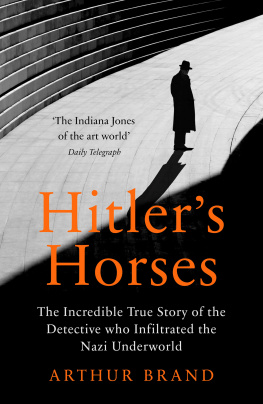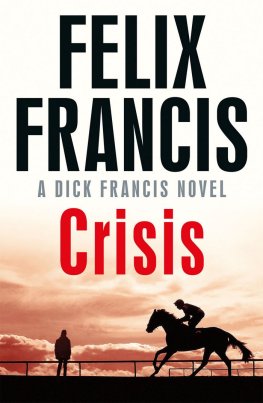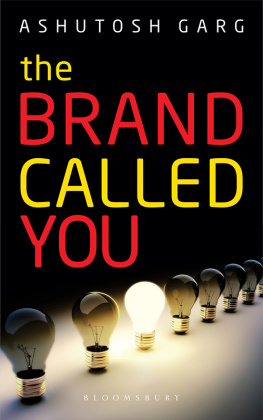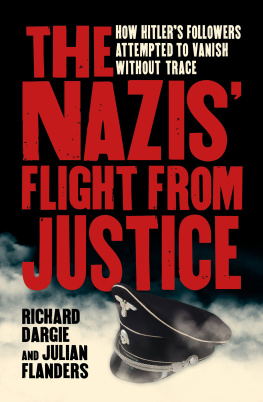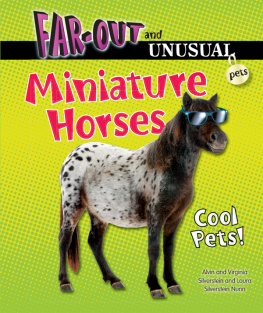

Arthur Brand
Hitlers Horses
The Incredible True Story of the Detective Who Infiltrated the Nazi Underworld
Translated by Jane Hedley-Prle

Contents
About the Author
Arthur Brand (Author)
Arthur Brand is one of the worlds most prominent art detectives, recovering lost treasures such as Hitlers horses, and paintings by Dali and Picasso. The total value of the cases solved by Brand is estimated at over 220 million euros.
Jane Hedley-Prle (Translator)
Jane Hedley-Prle studied German and Dutch in the UK before settling in the Netherlands, where she works for the Dutch Ministry of Foreign Affairs. Her book translations include Mazel Tov by J.S. Margot, What About Me? by Paul Verhaeghe, The Republic: A Novel by Joost de Vries and The Fetish Room by Rudi Rotthier and Redmond OHanlon.
For Irene Bakker-Ferweda
With thanks to my father and Paul Eggermont
Arthur is an idiot, but a clever one
Dick Ellis, Founder of the Art & Antiques Squad, New Scotland Yard, London
List of Illustrations
Maquette of the Reich Chancellery in Berlin, featuring a model of one of the horses by Josef Thorak. Architect: Albert Speer.
The photo that the author was shown of the horses when they were offered for sale.
Still from a film in which Hitler meets young soldiers in the garden of the Reich Chancellery, 20 March 1945. The spot where one of the horses should have stood is occupied by a soldier.
Albert Speer, Adolf Hitler and Arno Breker in Paris, 1940. Photo: Heinrich Hoffmann.
Josef Thorak in his studio, 1940.
Josef Thorak in his studio with a plaster model of one of his horses.
Hitlers office in the Reich Chancellery.
Gudrun and Heinrich Himmler.
Family by Hans Schmitz, 1938.
Arthur Brand and the model horse by Josef Thorak.
A Russian soldier posing with one of the horses in East Germany. Year unknown.
Arthur Brand and Konstantin von Hammerstein.
Arthur Brand in front of Josef Thoraks studio.
The Reich Chancellery in Berlin, with the statues Die Partei (The Party) and Die Wehrmacht (The Army) by Arno Breker.
Hilda, Josef Thoraks wife, late 1930s.
Der Wchter (The Watchman) by Arno Breker.
The horses being seized by the police.
The horses were sawn off at the legs in order to transport them out of East Germany.
The anti-aircraft gun vehicle found when the horses were seized.
Arthur Brand and Ren Allonge.

Prologue
Fhrerbunker, Berlin
22 April 1945
Adolf Hitler hasnt seen daylight for a month now. Holed up in the Fhrerbunker, hes ordered his troops to fight to the last man. Russias Red Army 2.5 million soldiers, 6,250 armoured vehicles and 7,500 planes has launched its attack on Berlin. The capital of the Third Reich is surrounded.
Some of his closest associates are leaving the underground bunker in a desperate attempt to flee Berlin, but on this day Hitler is joined by his most loyal followers, propaganda minister Joseph Goebbels and his wife Magda.
The bunker is virtually cut off from the outside world and theres an apocalyptic feel to the place. Only one telephone line is still working. Large quantities of alcohol are being downed to wash away the thought of what is to come. Only Hitler still believes in final victory. As he moves non-existent divisions around a map, one of his generals enters.
Mein Fhrer, our counter-attack to the north of Berlin has failed. Eberswalde has been taken by the Russians.
In fact, Eberswalde, a small town about 50 kilometres north-east of Berlin, would only be captured four days later by the Russians, on 26 April. But for Hitler, this report the result of a miscommunication is the final straw. Overcome by one of his fabled attacks of rage, he rails against his generals.
They have betrayed me! It is over. The war has been lost. The only course left to me is suicide.
Seventy years later, Eberswalde will make international headlines again in connection with one of the longest-kept secrets of the Second World War and the Cold War

1
Livorno, Italy
2014
As soon as the plane brakes on the runway and my fellow passengers heave a sigh of relief, I always start to stress out. Where are the taxis? Will the driver go round the town three times and charge me an astronomic fee before dropping me off? Sometimes Im lucky enough to get picked up. Depending on who my contact is, a car with diplomatic number plates might await me, or a chauffeur-driven limousine, sent by a wealthy client.
At Pisa Airport I was met by a man from a Chinese takeaway. Who turned out not to speak English. Gesturing towards the back of his white van, he wrenched open the rear door with some difficulty and shoved me inside. The floor was covered in empty soft-drink bottles, crumpled menus, a torn sack of rice and a mouldy green pepper. The stench was appalling. Legs braced, I crouched against the side. The passenger seat was occupied by a bag of food containers. Clearly I was just a consignment squeezed in between two deliveries. The driver shot off as if his life depended on it, not bothering to avoid the potholes.
I felt relieved. Admittedly, my flight had been massively delayed, but Id got through Customs in one piece. Not that I had anything to hide, but the man I was on my way to see possessed a strange sense of humour. It wouldnt have been the first time that a Customs officer had picked me out of the queue. Weve had an anonymous tip-off that youre smuggling art. Id be led off, to curious and disapproving looks from my fellow passengers. On arrival at my destination, my host would grin broadly. So, how was your trip? Luckily he hadnt played any pranks on me today.
For weeks Id managed to put off this meeting. After Id run out of excuses and the threats were ramping up If you dont come now, Ill have you fetched I bought a ticket. A day return from Amsterdam.
After a short drive, the van stopped abruptly. The driver jumped out, opened the rear door and pulled me out by my arm. He bowed slightly and drove off. I took a deep breath. The reek of the van had made me nauseous.
I was standing in front of a grey five-storey building. The sunlight blinded me, but I recognised the surroundings: the canal with clear blue water in which you could see fish swimming, the little stone bridges and the clusters of parked scooters. On the other side of the canal stood Livornos impressive fort, built back in the day by the illustrious Medici family. I walked to the door and rang Professor Richardsons doorbell. My host changed his identity regularly, and here he was passing himself off as an English professor.
Chi ? someone asked through the intercom. Arthur.
Next page
